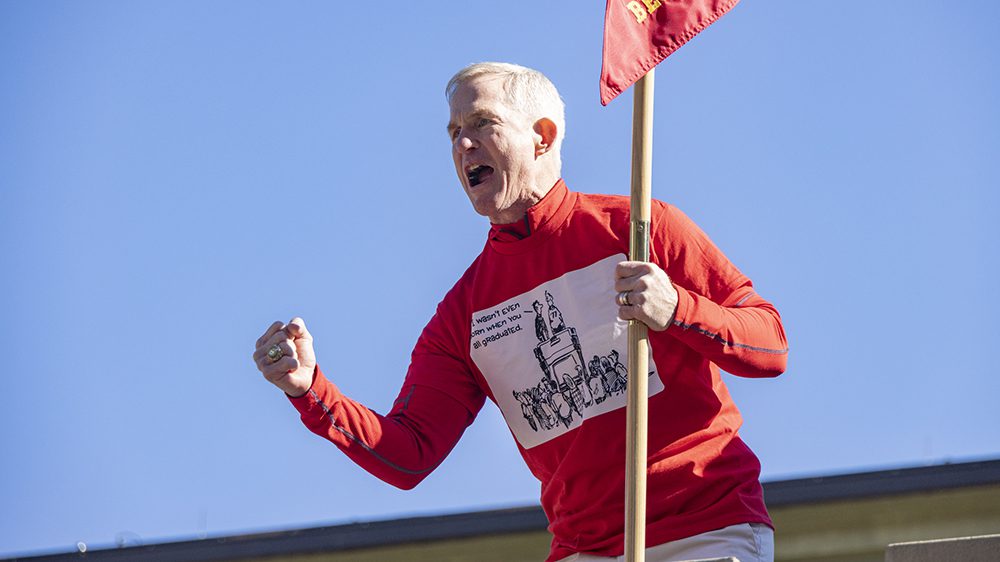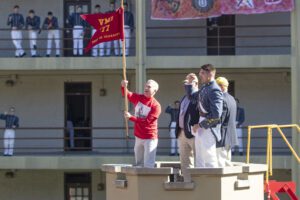Latsha ’77: A “Divine Intervention”

Kimber Latsha ’77 leads an Old Yell for the Class of 1977 at the 45th Reunion in fall 2022.

Kimber Latsha ’77 leads an Old Yell for the Class of 1977 at the 45th Reunion in fall 2022.
It’s an awfully long way from a chicken processing plant in central Pennsylvania to the Turman Room in Preston Library, the meeting place of the VMI Board of Visitors—and the distance isn’t just measured in miles. Incredibly, though, it’s a path that Kimber Latsha ’77, J.D., traveled on his way to becoming a Board of Visitors member, going from a working-class childhood to a successful career as a healthcare attorney and strong advocate for VMI.
Latsha, who served on the Board of Visitors from 2009–17 and is a current member of the VMI Foundation Board of Trustees, never once dreamed as a child of the path his adult life would take. He was a first-generation college student, and the circumstances that brought him to the Institute were so random and happenstance that Latsha credits “divine intervention” for bringing him to VMI.
“I really do believe that God orchestrated these events to provide an opportunity to me and intervened in my life and that He continues to do so,” said Latsha.
A longtime Institute Society member, Latsha is passionate about sharing what VMI did for him—and just as passionate about giving back so that current and future cadets might have the same opportunity he did.
“I could never have afforded to go to Virginia Military Institute,” he stated. “We were relatively poor, but I didn’t know that.”
Growing up with his four siblings in the small farming community of Dornsife, Pennsylvania, Latsha always thought he’d be a teacher and a coach because those were his role models. By high school, he was wrestling and playing football, and after high school, he planned to accompany his girlfriend to a small teacher’s college not far from home. Latsha’s future seemed assured—until, as he describes it, “God intervened.”
Playing as the quarterback of the football team, Latsha was injured during a game in October of his senior year and had to visit the family doctor. The doctor just happened to be Dr. Richard Stark, then a member of the VMI Parents Council and the father of Mike Stark ’74. During the visit, the physician asked his young patient what he intended to do after high school. When Latsha told him about the teacher’s college, Dr. Stark mentioned VMI.
Intrigued by this school he’d never heard of, Latsha asked some questions and was happy to learn that both a history major and a commission into the military were possible at VMI.
“All of my life, I’d loved history,” Latsha related. “I read a lot of military history. I grew up playing Army, loved military history. … A light went off in my head.”
As the visit wrapped up, Dr. Stark told Latsha that he’d write a letter of recommendation for him. Then, Latsha had a sobering thought. He asked the doctor, “How much does it cost?” To this day, Latsha hasn’t forgotten the response, as Dr. Stark told him that if he really wanted to go, money could be found—but an application would be the first step.
"Honor, integrity, noble conduct, putting others ahead of self … I think that’s still taught and cultivated at VMI, and our country needs to encourage and preserve those values desperately.”
Kimber Latsha ’77, J.D.
Once accepted to VMI, Latsha learned that his parents’ income would qualify him for a number of grants. Once he’d maxed out the number of grants he was eligible for, it was time for a job—and that’s where the chicken plant came in, as his parents lived paycheck to paycheck and couldn’t afford to contribute to the cost of college.
Working after school and over the summer, including some overtime and double shifts, Latsha earned over $1,000, an amount equal to $6,775 today. With his earnings in hand, he was just $1,300 short of the amount needed to enroll at VMI. A federal student loan covered that amount, and soon, Latsha was headed to Lexington to matriculate with his brother rats.
“I believe that was a divine intervention because it really changed the trajectory of my life and in an astronomical way for me, and opened up doors that I didn’t even think I could explore … or even have the opportunity to knock on,” said Latsha of the chain of events that brought him to the Institute.
After that first summer in the chicken plant, money never stood between Latsha and a VMI diploma. “After my first year, [VMI] found a way to get money to me over and above whatever grants the federal and state government gave to me because of my financial situation at home,” Latsha explained. “The margin between that and the cost of VMI was made up by the Institute, but for a couple hundred bucks, which I could make every summer.”
With Stark as his dyke, Latsha rapidly found his place at VMI—and by the time his 2nd Class year began, he wasn’t the only Latsha in barracks anymore, as his brother, Kirk Latsha ’79, had matriculated and had joined his brother on the wrestling team.
Over the four years of his cadetship, success after success came Latsha’s way. He was elected president of his class—a role that Latsha calls “the greatest honor of my life”— and received the Superior Cadet Award in the Army ROTC program during his 1st Class year. In addition, he received the Valor Bronze Cross for Achievement and was co-captain of the wrestling team his 2nd and 1st Class years.
At graduation, where he received a Bachelor of Arts degree in history, Latsha was honored as the recipient of the Second Jackson-Hope Medal for Academic Achievement and the Randolph T. Townsend Award, which is given to the first standing graduate in the history curriculum.
Latsha doesn’t see himself as someone naturally brilliant—rather, the Institute’s environment, with the leveling effect of the Rat Line, created ideal circumstances for him to thrive.
“I’m a very competitive person naturally,” he explained. “And so, you put somebody in an environment that tears them down, like the Rat Line does, and give everybody a buzz haircut and put them in the same uniform and say, ‘you’re starting from scratch,’ … I wanted to prove that I could do this, and so I worked hard and developed a passion to learn. Once you love to learn, learning is easy and fun.”
Midway through his cadetship, Latsha began to think about law school, and he wound up receiving a scholarship to the University of Pittsburgh Law School. There, he encountered classmates who were constantly lamenting the onerous workload of studying law—but to Latsha, accustomed to balancing multiple demands at VMI, law school was a step down in difficulty.
“[Academics] were all I had to do,” he explained. “Law school was relatively easy for me.”
After graduating from law school, Latsha served on active duty with the Judge Advocate General’s Corps from 1981–84. Assigned to the staff judge advocate of Fort Gordon, Georgia, he served primarily as a prosecutor, and because the post was exclusive federal jurisdiction, also as a special assistant United States attorney. Upon completion of his service, the Army awarded him its Meritorious Service Medal. After active duty, Latsha served for five years in the U.S. Army Reserve.
Moving into private practice, Latsha started his own firm, Latsha Davis & Marshall, P.C., where he established a national reputation as one of the leading healthcare attorneys in his field, centered on the growing industries of post-acute care, continuing care retirement communities, and long-term care.
 Away from work, he was instrumental in efforts to establish the VMI Alumni Association’s Central Keystone Chapter.
Away from work, he was instrumental in efforts to establish the VMI Alumni Association’s Central Keystone Chapter.
Today, Latsha still remembers the sense of unreality he felt when he received a call from Paul Maini ’66, then-Alumni Association executive vice president, inviting him to join the Board of Visitors.
“To be asked to serve on the Institute’s board,” he recalled. “I would look up at those guys when I was a cadet, and never in my wildest dreams did I think I’d ever serve on that board.”
Throughout his time on the board, Latsha served on two committees: The Academic Affairs Committee and the Appeals Committee. Latsha was the chairman of the latter committee from 2012–17, and under his leadership, the committee reviewed and reformed the Honor Court’s standard operating procedures. Latsha also advised those who served as the superintendent’s representatives to the Honor Court and acted as a mentor to numerous members of the Honor Court. In addition, he was vice president of the board from 2012–17.
Latsha’s desire to give back is motivated not only by his own experience of being offered more opportunities than he’d ever dreamed possible but also by the bedrock values of VMI that have remained constant over the decades: A commitment to honor, the leveling effect of the Rat Line, and classical liberal arts education.
“I think it brings the best out in people, and when you mold them into a VMI woman or man, instilled with honor, integrity, noble conduct, putting others ahead of self—self-sacrifice, endurance, and perseverance. … I think that’s still taught and cultivated at VMI, and our country needs to encourage and preserve those values desperately.”
By Kimber Latsha ’77
As the 50th anniversary of the Institute Society approaches, I hope you will consider joining me as a member. As alumni, we share the common bond of the formative VMI experience, for which we are all thankful. Being a member of the Institute Society provides an opportunity to express our collective gratitude in a tangible manner that supports the efforts of VMI and the Corps itself to forge cadets with the leadership characteristics of integrity, honorable conduct, self-sacrifice, perseverance, and service—traditional values that we all esteem and which are greatly needed in our culture today.
The combined philanthropy of nearly 900 members of the Institute Society supports the ability of VMI to operate from a financial position of strength, and more members are needed to preserve that position of financial strength, which is essential to the VMI mission and legacy of developing honorable men and women prepared to lead. By giving to VMI and, if financially feasible, joining the Institute Society, we have the opportunity to set an example of generosity and support that will serve as an encouragement to cadets and enhance their VMI experience. I encourage you to take advantage of the opportunity to give and to join the Institute Society.

The development writer plays a key role in producing advancement communications. This role imagines, creates, and produces a variety of written communication to inspire donors to make gifts benefiting VMI. Utilizing journalistic features and storytelling, the development writer will produce content for areas such as Annual Giving, stewardship, and gift planning.